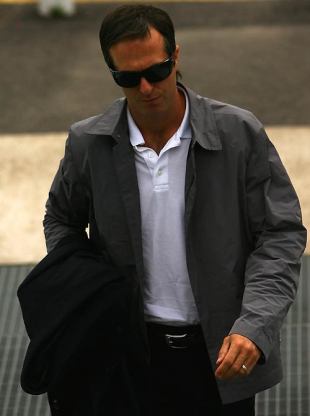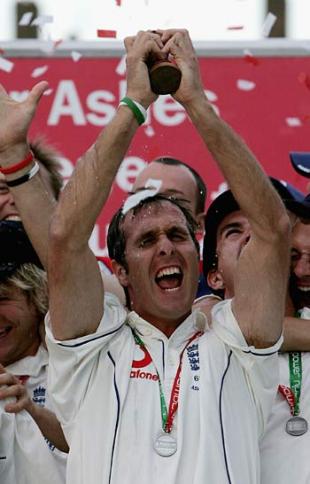The man who played his part
Vaughan was a tough, intuitive captain who was given the task of charting a path forwards, which he did admirably
06-Aug-2008
|
|

|
Michael Vaughan produced a rousing England side that for several years played some spirited cricket, culminating in one exhilarating and exhausting campaign. Then he suffered as his team omitted to build upon its breakthrough. Frustrated by injury and weakened by the loss of important players, Vaughan ran out of runs and inspiration. It was not that he lost heart, dignity or hope. Indeed, his manner was constant and commendable. Throughout he displayed pride in achievement and a willingness to accept defeat; there was passion but not anger. Unyielding on the field, yet aware of wider responsibilities, he spent his time fighting for things, not against them. There was no meanness in him, and a good deal of humour.
But he knew his time was up. No man can escape his own honesty. A fresh spirit, a new voice, was needed to rejuvenate a beaten side, so he stood down. As usual, it was the right move at the right time. If anything, he had lingered too long, but that was caused not by vanity or greed but because the succession had not been settled. Eventually, though, even the most competent leaders must step aside regardless. No one is indispensable. Vaughan's main mistake as leader had been to hover around the fringes of the England party as things fell apart in 2006-07.
Vaughan must have yearned to leave with cheers ringing in his ears, but few leaders are so privileged. Sport pushes people along and eventually forces them out. In any case his legacy is impressive. He rallied his country behind its team, played his part in one of the game's most memorable series and one of his country's most famous wins. That it did not last was hardly his fault. Not long afterwards he lost his senior opening batsman and also his fastest bowler. Meanwhile, the nation had fallen into a deep trance of self-satisfaction. Australia learnt a lot from its defeat, England nothing from its victory. And so Vaughan's highest aspirations were thwarted.
As the rise was compelling and the triumph thrilling, so the decline was painful and eventually debilitating. Inevitably it took a toll on the leader.
Cricket plays tricks with the mind. Woe betide a captain whose energy has been drained, for though he will feel the same, he will make mistakes at the crease, on the field, and in the pavilion, and it is the devil's own work to put it all back together. Having devoted himself to building a formidable side, Vaughan could not start again. Instead, he tried to recreate the past and that is beyond man's capacity.
As retirements provoke smiles, so resignations tend to lead to an excess of gloom. But Vaughan's achievements were considerable and go beyond recapturing the Ashes. That was the result of years of endeavour. Already England had fought their way up the rankings till they held second place. It was a rise that instilled the confidence needed to fight back from heavy defeat in the first match of that epic series, a contest staged at Lord's, where Glenn McGrath ran amuck. It was in this adversity that Vaughan proved his worth. Far from allowing pessimism to take root, or caution to work its mischief, he advocated a forthright counterattack. And his team believed him. It was a telling moment, and proof that he had succeeded.
It took a lot of hard work from Vaughan and his predecessors to get English cricket to that point. England has retained a curious affection for the 1980s, a period of false champions, poor results and disaffection; a time of drugs, rebel tours, arranged declarations, lob bowling, and widespread cynicism. Lacking leadership, without legitimate heroes, English cricket went into a decline that was for some time concealed by the ability of its senior players.
| In hindsight it must seem that everything fell into place in five minutes, but a lot of difficult decisions had to be taken. It's easy to get them wrong, and to waste time trying to retrieve the situation. But the new navigator knew where he wanted to go. His mind lacked confusing clutter | |||
Michael Atherton started the long process of raising standards. Diligently and dutifully he set about restoring pride by the simple means of making his team harder to beat. It fell to him to restore service, a task he accomplished, though not entirely to his satisfaction. But Atherton lacked sparkle, felt himself confined, and could take the team no further.
Nasser Hussain continued the revival, matching Atherton's stubbornness and pride and adding his own inner fury. Results did not improve immediately because the problem was deeper than most Englishmen were prepared to acknowledge, but the team was going forwards. And the same applied to the game at large, for the national side does not exist in a vacuum. But there was a lot still to be done. At least, though, England looked fallible rather than frail.
Eventually Hussain's time ran out and he moved inexorably to the commentary box. Now England was forced to choose between two impressive candidates, pals from under-19 days: Marcus Trescothick and Vaughan. Both had admirable qualities.
Trescothick seemed sturdy and considerate. I can remember captaining him in a 2nd X1 match in Somerset. One of the bowlers had lost his bearings. After a while the burly opener came across and gently pointed out that the errant player was in sore need of encouragement. Never mind that Trescothick's own game had deserted him. Vaughan appeared clever and slightly brittle, a designation that proved to be inaccurate.
England plumbed for the stylish right-hander. From the moment he took charge it was clear that Vaughan knew his own mind. The rot had been stopped and it was time to attack. In hindsight it must seem that everything fell into place in five minutes, but a lot of difficult decisions had to be taken. It's easy to get them wrong, and to waste time trying to retrieve the situation. But the new navigator knew where he wanted to go. His mind lacked confusing clutter. Indeed, it was as polished and simple as his batting. He knew that cricket was about taking wickets and scoring runs and that at the highest level a third ingredient was required - character.
Vaughan had an appropriate foil in Duncan Fletcher, a taciturn man with equally firm ideas about cricket and cricket teams. Together the pair set about instilling constancy in their team. In their hands England remained for several campaigns a work in progress. They concentrated on building mental aggression and resourcefulness. Most particularly they pinpointed the need for tall fast bowlers, fearless batsmen, and loyal servants of the cause. It is a familiar formula but more easily stated than put into practice.
By the time the Australians arrived in 2005 the team was ready. It was a close-run thing. Australia did not lose any of the matches in which McGrath played. The visitors were one off-drive away from taking a 2-0 lead. But Vaughan kept his head, continued to attack, and deserved his triumph. Determined to confront his opponents, he set challenging fields and unleashed upon them a four-pronged pace attack. He did not chide batsmen for losing wickets to adventurous shots or complain when things went wrong. Most of all, England used reverse swing to unsettle the visiting left-handers, none of whom had a happy tour. In every way Vaughan outmaneuvered his counterpart.
|
|

|
Admittedly he had at his disposal a match-winning batsman, four dangerous pacemen and an all-rounder - which gave him the luxury of playing seven batsmen and five bowlers. But it was not entirely luck, a trait that in any case Napoleon sought in his generals. Vaughan had searched for the fast bowlers and showed faith in them, encouraging them to explore their talents. And he extracted the best from Freddie Flintoff. Until Vaughan took charge, Flintoff had been hesitant and unappreciated. Kevin Pietersen was also given his head. To a large extent Vaughan made his own fortune.
It will hurt Vaughan that England petered out. The intentions were good. Players were often heard saying that beating the Aussies was only the first part of their programme. Doubtless the sentiments were sincere. Better than anyone else, the players and their captain knew that the Australians would be back. It was a time for congratulation not complacency. But England dished out gongs, wrote memoirs, signed contracts, and let their bowling coach slip through their grasp. Meanwhile the Australians went back to work.
England lost their way. The frame of mind attained in 2005 did not hold, let alone spread. Vaughan, Simon Jones and Flintoff suffered injuries. Steve Harmison went back to his couch. Matthew Hoggard lost his nip - so they say. Trescothick was undone by sorrow. It must seem like bad luck fell upon the victors, but it was not as simple as that. England became self-indulgent, even self-important. And so they went to Australia and, despite doughty work from the newcomers, Alastair Cook and Paul Collingwood, were mauled. The thinking had gone wrong, the application was missing, the good work had been undone.
Try as he might, Vaughan could not manage a second restoration. He did not play often enough or score enough runs, and could not provide the drive or direction. It fell to him to show what could be done, to chart the path forwards and then to depart. Vaughan demonstrated that, properly led, England can rise. It is a point some of us had begun to doubt. He is a fine batsman in the classical style and has been an excellent leader, tough and intuitive. Most of all Vaughan built a strong culture in his side; it is a precious asset and not to be squandered.
Now it may be Vaughan's fate to play in an England side containing a subcontinental allocation of former captains. He must feel that he has more runs in him, more to contribute, but it might not be easy to summon the will power needed.
Peter Roebuck is a former captain of Somerset and the author, most recently, of In It to Win It